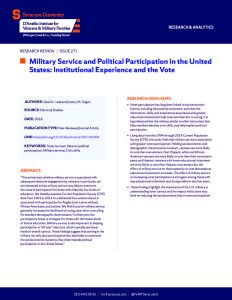ABSTRACT:
“This article tests whether military service is associated with subsequent electoral engagement by veterans. In particular, we are interested in how military service may help to overcome the costs of participation for those with relatively low levels of education. We thereby examine Current Population Survey (CPS) data from 1994 to 2014 to understand how veteran status is associated with participation for Anglos (non-Latino whites), African Americans, and Latinos. We find that prior military service generally increases the likelihood of voting, even after controlling for standard demographic determinants. Furthermore, the participatory boost is strongest for those with the lowest levels of formal education. Military service is also important to shaping participation in “off year” elections, which typically see lower levels of overall turnout. These findings suggest that serving in the military not only spurs participation but also helps to overcome the socioeconomic dynamics that often impede political participation in the United States.”
RESEARCH HIGHLIGHTS:
- Voter participation has long been linked to socioeconomic factors, including educational attainment, such that the information, skills, and experiences associated with greater educational attainment help overcome barriers to voting. It is hypothesized that the military, similar to other institutions that help members develop civic skills, may help explain political participation.
- Using data from the 1994 through 2014 Current Population Survey (CPS), this study fnds that military service is associated with greater voter participation. Holding socioeconomic and demographic characteristics constant, veterans are more likely to vote than nonveterans. Non-Hispanic white and African American veterans are more likely to vote than their nonveteran peers and Hispanic veterans with lower educational attainment are more likely to vote than Hispanic nonveterans but the effect of military service on the propensity to vote decreases as educational attainment increases. The effect of military service on increasing voter participation is strongest among those with less educational attainment and during midterm election years.
- These findings highlight the importance of the U.S. military in understanding voter turnout and the impact institutions may
have on reducing the socioeconomic bias in voter participation.

